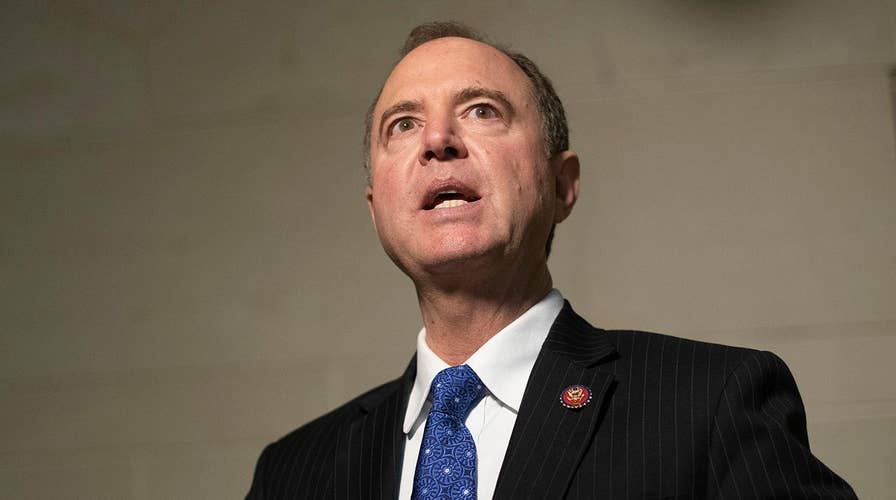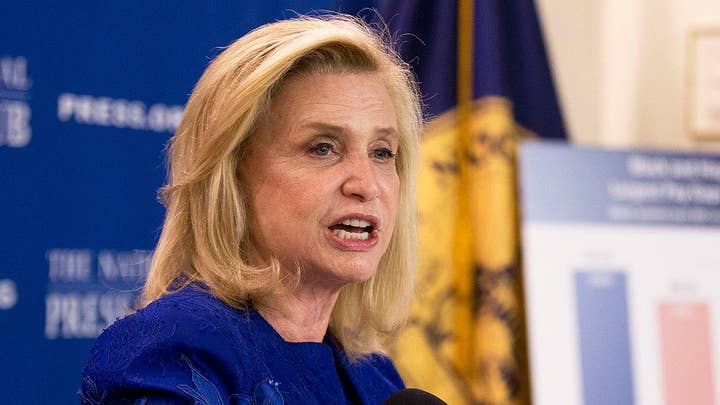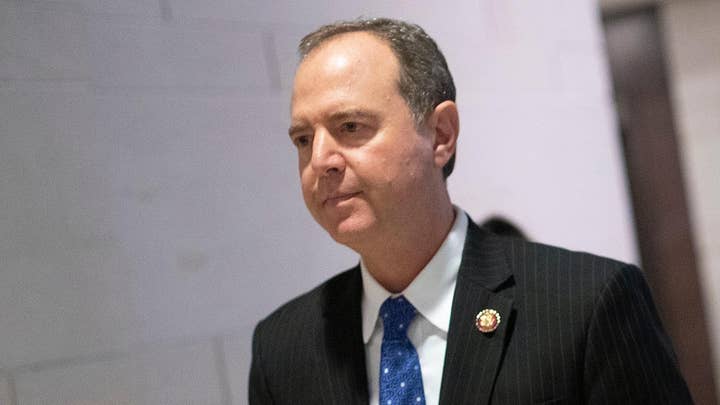House Democrats kill resolution to censure Rep. Adam Schiff
Reaction and analysis from Reps. Lee Zeldin, Andy Biggs and Chris Stewart on 'The Ingraham Angle.'
Rep. Carolyn Maloney, D-N.Y., the new acting chairwoman of the House Oversight and Reform Committee, is highly unpopular with one prominent constituent—President Trump.
Oversight is one of six committees House Speaker Nancy Pelosi, D-Calif., has tapped to run the impeachment inquiry. It just so happens Maloney’s 14th Congressional District in Manhattan includes Trump Tower.
REPUBLICANS PRESS FOR WHISTLEBLOWER TESTIMONY
But she and other impeachment committee chairs also come to the political fight of the decade with past controversies that could be magnified as the president and his allies look to fight back.
House Intelligence Chairman Adam Schiff, D-Calif., the de facto leader on impeachment, already has faced an ethics complaint and a failed bid by Republicans to censure him for how he’s conducted the inquiry thus far.
Maloney, Schiff and the other lawmakers at the helm are likely to face more GOP attacks in the weeks ahead.
“These committees have turned the machinery of government into one big political machine,” Tom Anderson, director of the government integrity project at the National Legal and Policy Center, a conservative government watchdog group, told Fox News.
In the cases of Presidents Richard Nixon and Bill Clinton, the full House voted to establish an impeachment inquiry, handled by the Judiciary Committee with public hearings. In the case of Trump, Pelosi unilaterally announced an inquiry and named six committees to probe.
Maloney ascended to acting chairwoman after the death of Rep. Elijah Cummings, D-Md., last week. The oversight committee has been heavily involved with the House Select Committee on Intelligence and the House Foreign Affairs Committee in seeking documents and testimony from Trump administration officials and associates regarding allegations that Trump linked U.S. aid to Ukraine to a request for political favors. The Judiciary, Financial Services, and Ways and Means committees are also involved.
Spokespersons for the six committee chairs did not respond to inquiries for this story.
Here’s a look at past and present controversies that could re-emerge.
Carolyn Maloney
Maloney is among the wealthiest members of Congress and most of her non-congressional income reportedly is from real estate partnerships. Among those is Linkhorn Place Associates, which owns two Virginia Beach apartment complexes that evicted about two dozen tenants from 2013 to 2018, according to The New York Daily News, which reported tenants complained about problems with the units, with one using the term “slum lord.” The landlords were described as quick to kick tenants out.
Maloney and her siblings each inherited a 4.8 percent stake in the property. The congresswoman reportedly earned between $30,000 and $90,000 income on the property from 2013 to 2016.
IMPEACHMENT WITNESS TO TESTIFY OVER WEEKEND
A Maloney spokesperson told the Daily News that the congresswoman was a “defender of, affordable housing, rent regulation and tenant protection,” and had “inherited a non-managerial passive minor interest in the Linkhorn apartments.”
Also, in 2017, The Washington Free Beacon reported that Maloney traded between $363,000 and $1.3 million in municipal bonds, after co-writing a bipartisan bill to encourage banks to buy back the bonds. The same month the House passed the legislation directing federal bank regulators to count investment-grade municipal bonds toward a bank’s liquidity requirements, Maloney made the bond trades.
Adam Schiff
Schiff has come under fire for making up a “parody” dialogue between Trump and the Ukrainian President Volodymyr Zelensky during an intelligence committee hearing. He has also faced criticism for not being forthright about whether his office communicated with the Ukraine call whistleblower before the complaint was filed.
The Tea Party Patriots filed a complaint with the Office of Congressional Ethics over what it called a violation of House Rule XXII, which would be a “pattern of misconduct.”
“[R]ather than entering into the record the actual transcript of the call, Rep. Schiff chose to depart from all normal and customary protocols of the House, and proceeded to open the hearing of the Intelligence Committee with a fictional narrative of what he apparently wished the transcript of the call to have been,” Jenny Beth Martin, the honorary chairman of the Tea Party Patriots, wrote in her letter.
Previously, Judicial Watch filed an ethics complaint over his communications with witnesses such as Glenn Simpson of Fusion GPS and Trump’s former personal lawyer Michael Cohen.
Jerry Nadler
Rep. Jerry Nadler, D-N.Y., chairman of the House Judiciary Committee, hasn’t faced accusations of ethical lapses, but the impeachment battle might mark the culmination of a decades-long rivalry between him and Trump. When Nadler served in the New York State Assembly in the late 1980s, he fought Trump’s effort to get approval for an apartment development in Manhattan’s Upper West Side, which was going to be called “Trump City.”
Trump wanted it to include a TV studio, private park and shopping mall. As a state lawmaker, Nadler sided with community activists opposing the project. As a member of Congress in the early 1990s, he blocked a federal mortgage guarantee for the Trump development. Trump got the project built, but in his 2000 book, “The America We Deserve,” Trump called Nadler, “one of the most egregious hacks in contemporary politics.”
Anderson noted this could be the reason for making Schiff the key leader in impeachment.
“Nadler has faded to the background,” Anderson said. “Maybe that is because of his past relationship with Trump. He also seems to have been ineffective with some of his previous investigations.”
Nadler’s view on impeachment has changed significantly since the Clinton era.
Nadler once called the effort to impeach Bill Clinton in 1998 a “coup d'etat” and said, “Members of Congress have no power, indeed they have no rights, to arrogate to themselves the power to nullify an election absent such a compelling threat.”
Maxine Waters
The House Ethics Committee cleared House Financial Services Chairwoman Maxine Waters, D-Calif., of allegations in 2012 that she steered a $12 million federal bailout to a Massachusetts bank, OneUnited, where her husband was a board member.
The committee did, however, determine Waters’ then-chief of staff Mikael Moore violated House standards by taking action to help the bank get funding. Nevertheless, the committee, at the time chaired by Rep. Bob Goodlatte, R-Va., concluded Waters met with Treasury Department officials to get help for minority-owned banks, not just the one that her husband was involved in.
A Federal Elections Commission complaint filed last year focuses on Waters’ use of slate mailers and how her family members are allegedly making money as a result of her campaigns. After her re-election, additional mailer questions emerged.
Eliot Engel
In 2009, the Maryland Department of Assessments and Taxation revoked a state tax credit to Rep. Eliot Engel, D-N.Y., now the chairman of the House Foreign Affairs Committee. He campaigned as a lifelong resident of the Bronx but listed his Potomac, Maryland home as his primary residence, allowing him to qualify for at least $7,000 in special tax credits over the previous four years.
The credit required homeowners to live in Maryland six months of the year, have a Maryland driver’s license, file Maryland income tax and have a Maryland driver’s license. Engel had a New York driver’s license and voted in New York.
In 2011, the Office of Congressional Ethics dropped a probe of Engel regarding suspicions that he misspent $738 in travel funds. His spokesman said he was “fully exonerated.”
The Wall Street Journal had reported the probe found substantial reason to believe Engel was among six House members to allegedly improperly keep cash meant to cover expenses on overseas trips.
But in its conclusion on the probe of the six congressmen, the office concluded “there is insufficient evidence to determine with any degree of certainty that any one of the Members were provided an amount of per diem that was not necessary for their respective trips.”
Richard Neal
In September, a government watchdog group filed a complaint with the Office of Congressional Ethics against House Ways and Means Chairman Richard Neal, D-Mass., claiming he “used his government-funded congressional Facebook page to run campaign advertisements” before his 2018 primary.
The Foundation for Accountability and Civil Trust complaint stated the congressional Facebook page said, “Commit to vote on September 4th for Richard Neal” with a disclaimer, “Paid for by Richard E. Neal for Congress Committee.”
House rules prohibit government communications—such as social media—being used for campaigns. The complaint acknowledged Neal paid for the cost of running the ads, but “the taxpayers pay for the official page.”
CLICK HERE TO GET THE FOX NEWS APP
A Neal spokesman said in September the campaign intended to place ads on his campaign Facebook page, but accidentally posted the ad on the congressional site. Further, no taxpayer funds were used.
















































